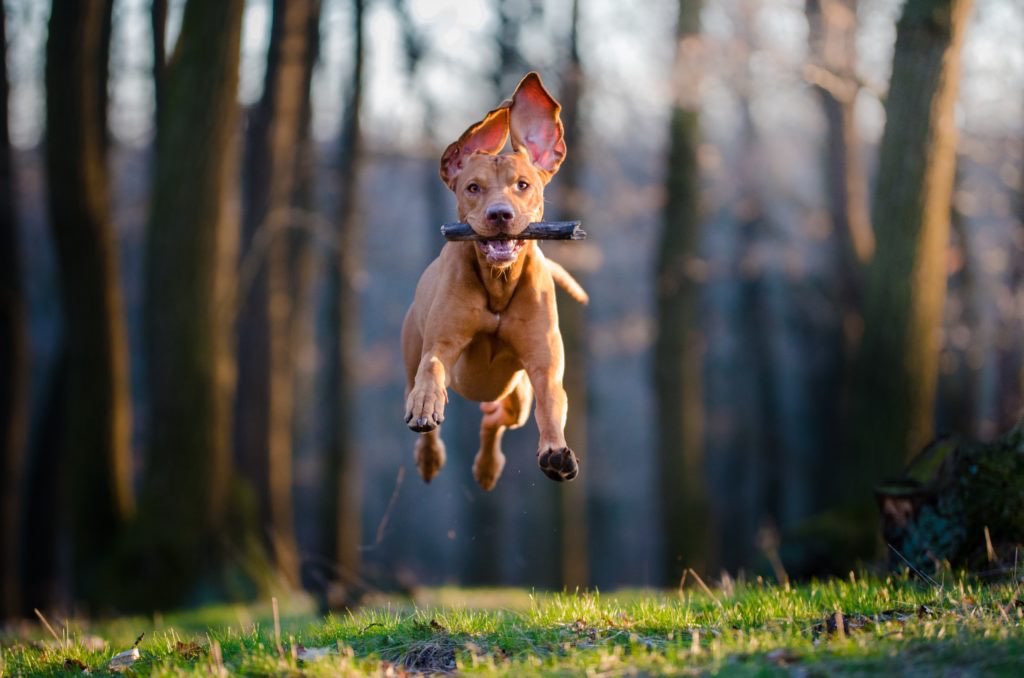Dogs jump due to an instinctual and polite desire to sniff one another’s noses. Dogs can acquire a lot of very interesting information from one sniff of another critter’s nose. Naturally, any dog can assume humans would love the same greeting. However, when Scruffy knocks Grandma Sue over because her breath smells like peanut butter crackers, it can be pretty startling!
Often dogs jump because it may have been encouraged to jump in puppyhood. It is quite cute when the dog is smaller. Unfortunately, the larger a dog is, the larger a jumping problem can become.
To do or not To do
Here and some Dos and Don’ts you can try to implement to discourage your dog from jumping:
Do ignore your dog’s jumping behavior by crossing your arms and turning around. Do not make eye contact. You can say “Down” or “Off” or simply nothing at all. Warning: Your dog may jump on your back when you turn around. If your dog doesn’t get the hint after 10-20 seconds, try leaving the room. Try exaggerating your exit while shutting the door behind you. Wait briefly (a few seconds to a few minutes depending on how much you trust your dog behind closed doors), then reemerge and ask your dog to sit or lie down. Only when your dog sits or lies down should you acknowledge them with affection or treats.
Do implement a replacement behavior. Dogs have a lot of trouble understanding the concept of “stop” or “No”. It is easier for them to be redirected to another replacement behavior. This usually means getting them to sit or lie down. When your dog starts jumping, it is critical to redirect them to a different desired behavior. If you want to get really fancy, you can even teach them to go to bed or get a toy.
Do be consistent. Consistency is possibly the most difficult part of dog training. To be consistent with your actions when your dog jumps, always try to use the same training techniques. Try to get everyone in the household to have the same response every time she jumps. The more consistent your behavior, the faster your dog will change her behavior.
Don’t yell. Obviously, your dog cannot understand what you’re saying when you yell. Yelling may actually scare your dog and damage your relationship. Oftentimes owners will yell their dog’s name in a raised, stern voice (“Scruffy! Stop that! Bad Scruffy!”). This helps your dog associate their name with negativity, which can be confusing for poor Scruffy. Next time you call your dog by name (“Here Scruffy!”) she may not come as quickly, possibly not at all. How can she be sure you aren’t upset? Only use your dog’s name when calling them or when she is “being good”. She should always associate her name with treats and affection.
Don’t physically punish your dog. Kicking your dog can get your dog to stop jumping right away, but it’s animal abuse and it will make them afraid of you and possibly a very angry too! Though it may stop jumping in the short term….you will most likely cause long term problems fueled by anxiety.
Don’t use the crate as a ‘time out’ space. It is totally okay to crate your dog prior to guests arriving. Although it will certainly stop her from jumping, putting your dog in her crate will cause her to view the crate as a place of punishment. This will hurt your chances of Scruffy feeling safe inside the crate and may lead to difficulties getting her into the crate in the first place.
Guests and Jumping
To avoid chaos when first learning not to jump, you can always crate your dog or put her in another room prior to guests arriving. Wait until your dog calms down to let her out! You can try giving her a toy (such as a Kong, bone, or stuffy) to distract her from the very exciting new humans.
When guests come over, meet them outside and arm them with treats before they even see your dog. Tell them to use quiet voices and move slowly when entering your home. Also instruct your guests to tell your dog to sit and show them the hand motion your dog responds best to. Tell them that they must ignore jumping by crossing their arms and turning away. Only when the dog sits should they treat her and give her affection. If she keeps jumping after taking the treat, just repeat the process.
Unfortunately your dog most likely won’t understand that it is okay to jump on you, but not people she doesn’t know. So even if you love it when you come home after a long day and she jumps up to give her a hug…allowing her to do so and rewarding her with affection will encourage her to jump on everyone else.
There are a lot of people who genuinely don’t mind when a dog jumps on them. That’s great! But it’s not great for ensuring your pooch never jumps on Grandma Sue again. Tell them you appreciate their patience but you are trying to teach Scruffy not to jump at all.
It is particularly difficult to be as consistent when different people come over. This proves to be extremely hard because you have a different relationship with each guest. You don’t want to appear bossy the first time your new boyfriend comes over. You don’t want to have to correct poor, deaf Uncle Boris on his dog training knowledge. You don’t want to improperly greet guests and miss out on welcoming hugs. You must, however, try your best if you ever want your dog to learn not to jump.

